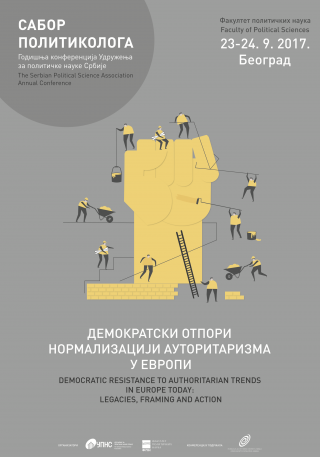The Serbian Political Science Association (SPSA) Annual Conference
23-24 September 2017, Belgrade
Strong authoritarian currents have swept across the continent in the last few years. Populist and/or far right politicians and ideas now shape the political agenda in many ‘old’ and ‘new’ democracies in Europe on a routine basis and in some are nearing power, boosted by popular discontent with enduring economic, migrant and security crises. In post-communist states, new authoritarians are gradually emerging as a dominant political force. Hegemonic view since the Cold War that considered liberal and democratic ideas and institutions as the only legitimate ones – which weakened authoritarian rulers and empowered democratic forces – has now largely vanished from the global political stage.
New authoritarians in new European democracies have already undermined press freedom and weakened various checks on the executive power, including legislatures, courts, anti-corruption bodies, central banks and various watchdog agencies. In some of these states, especially in the Balkans, elections are no longer free and fair. While these regimes remain competitive, this feature appears to be of a hybrid regime – and not democratic – variety. While coherent alternative authoritarian ideology has not yet emerged, new authoritarians effectively deploy populist themes to belittle and undermine genuine advances in democratic and economic development in the 2000s. In other parts of the region, ‘competitive chauvinism’ and minority rights violations have returned to the centre stage. Across the board, clientelism and corruption, which were tolerated by earlier democratic governments, are now deployed as important vehicles of political control and have become embedded in society.
And yet, after initial confusion and decline, democratic forces have returned to challenge the powerful authoritarian currents, though their effectiveness varies widely across the continent. A broad spectre of ideas rooted in various democratic traditions have re-energised debates on contemporary political issues. Some endorse liberal or social democratic positions, while others tend to be highly critical not only of authoritarian trends but also of capitalism and contemporary democratic institutions in general.
Democratic resistance to new authoritarianism now involves various organisational forms and repertoires of action. While some ‘first-generation’ democratic parties in new democracies have succumbed to clientelism, became co-opted by new authoritarians and lost credibility among the general public, others are busy regenerating themselves and challenging authoritarian trends. New parties have also emerged from those democratic groups in Serbia, Croatia, Slovenia that were upset by oligarchic propensities and cronyism of ‘old’ democratic parties. Both try to reframe political debates along the lines of democratic, liberal and/or leftist ideas. They also look to credible younger leaders and deploy various organisation and mobilisation vehicles and platforms, not simply to recover support among traditional democratic supporters but also to attract new ones.
Simultaneously, new civil society initiatives have resurfaced in resistance to new authoritarianism with the aim to defend human rights, democratic institutions, the rule of law, public goods and public spaces, as well as to support initiatives that tackle rising inequalities and various local causes. While some civil society groups keep on working closely with authorities to deal with these issues, others increasingly deploy disruptive political strategies. Popular protests, strikes and social movements have emerged to represent new constituencies, protect their rights, contest authoritarian governments and ruling parties, and delegitimise current political orders. Having in mind that media access of government opponents has been considerably reduced, new social media and other online platforms, and various alternative artistic practices, provide important spaces and tools for debate and mobilisation.
In response to growing authoritarian pressures, political parties and civil society groups have built temporary alliances and/or lasting pro-democracy coalitions that bridge traditional institutional and disruptive strategies and mix conventional political action with popular protests of various kinds. Recurring popular protests, election struggles and other contentious initiatives against authoritarian rule in Macedonia, recent massive demonstrations against corruption and unaccountable government in Romania, and popular protests in Serbia, Bosnia, Montenegro and Croatia in recent months and years have undermined populist authoritarians in power and revealed a large potential for popular mobilisation in the name of democracy and set the foundation for coming popular struggles.
New democratic forces pick and choose ideas and strategies from a large historical reservoir of traditions, ideas and legacies of resistance, within their own countries and internationally. Contemporary contentious politics draws on traditions of resistance – both democratic and unrelated ones – which abound in Europe in general and in Balkan states in particular. Peasant rebellions, uprising against foreign rule, revolutionary movements, institutional struggles, civil society activism and democratic revolutions against communist and post-communist authoritarian regimes provide a broad repertoire of action to choose from for new democrats.
International influences and pressures for democracy have subsided in the last few years, while mutual encouragement and support among new authoritarians in different European countries have blossomed, often behind the veil of anti-globalization. International influence that matters now is more support and learning from pro-democracy groups in countries that find themselves in a similar position.
We invite scholars who work on democracy and democratisation from various theoretical and methodological perspectives in political and social science and humanities to submit paper proposals that focus on the following issues, broadly conceived:
- Populist and far-right resurgence in European democracies and democratic responses
- Varieties of new authoritarianism in post-communist states
- Ideas and ideologies (or the lack of) behind new authoritarianism
- Ideas and ideologies behind new democratic resistance, including historical precursors as sources of inspiration
- Democratic parties and institutional resistance to authoritarian trends
- Civil society activism in defence of human rights and the rule of law
- Female resistance to restrictions of women's rights (e.g., Poland, Croatia, Serbia, the US)
- Defence of press freedom
- Resistance to neo-liberalization
- A centenary of the October Revolution: revolutionary ideas, ideologies and traditions as a source for democratic contentious politics today
- “The renewal of utopian energies”: three decades later
- Lessons of the ‘coloured revolutions’ and the ‘Arab Spring’ for new democratic resistance
- Resistance to immigration restrictions and refugee rights violations
- Forms and outcomes of the diffusion of democratic resistance across borders of the Balkan states
- International democracy promotion in an age of new authoritarianism
Organising Committee of the conference: Milada Vachudova (University of North Carolina, Chappell Hill), Anna Krasteva (New Bulgarian University, Sofia), Cirila Toplak (Faculty of Social Science, Ljubljana), Dejan Jović (Faculty of Political Science, Zagreb), Asim Mujkić (Faculty of Political Science, Sarajevo), Keichi Kubo (Waseda University, Tokyo), Miodrag Jovanović (Law Faculty, Belgrade), Radmila Nakarada, Snježana Milivojević, Jovan Teokarević, Đorđe Pavićević and Dušan Spasojević (Faculty of Political Science, Belgrade).
Please email paper proposals (including a paper title, abstract of 250-300 words, author’s email address and short bio) to Ms Biljana Djordjević, SPSA Executive Secretary: biljana.djordjevic@fpn.bg.ac.rs.
Deadline for paper proposals is 3 July 2017. The Organising Committee will inform all applicants about the outcome of their applications by 1 August. Papers from the conference will be published in conference proceedings or in a regional academic journal Političke perspektive (Political Perspectives).


